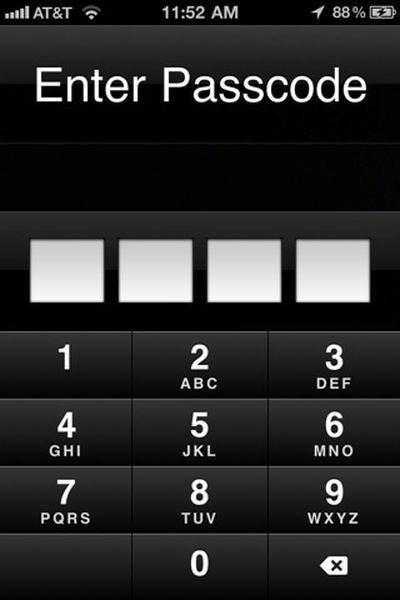Earlier this week, iOS developer Daniel Amitay published a report examining trends in passcodes chosen by users of his Big Brother Camera Security application. Amitay had anonymously collected over 200,000 passcodes used on his app and offered the data up as a proxy for actual iPhone passcode usage data based on the similarity of the input system style and functionality.

Amitay now reports that his application has been pulled from the App Store by Apple, although he is unsure at this time whether the removal was due to publication of the data or his admission of collecting it in the first place.
As of today at 4:58pm EST, Big Brother has been removed from the App Store. I'm certainly not happy about it, but considering the concerns a few people have expressed regarding the transfer of data from app to my server, it is understandable.
I think I should clarify exactly what data I was referring to, and how I was obtaining it. First, these passcodes are those that are input into Big Brother, not the actual iPhone lockscreen passcodes. Second, when the app sends this data to my server, it is literally sending only that number (e.g. "1234") and nothing else. I have no way of identifying any user or device whatsoever.
Amitay points to Apple's iTunes licensing agreement in support of his belief that he can collect such information, noting that he had planned on using the data collected to generate a list of common passcodes that would offer a warning of the codes being too obvious if they were chosen by a user. Consequently, it is unclear whether it is the collection itself or the publication of it that raised Apple's ire.
Amitay is currently reaching out to Apple to address the issue and have Big Brother Camera Security returned to the App Store.
Update: Amitay has updated his post to note that he has received a response from Apple relaying that his application was pulled for "surreptitiously harvesting user passwords". He has submitted an updated version of the application omitting the passcode collection capabilities and has appealed Apple's decision on the basis of the data being specific to the app, anonymized, and used for the purposes of improving the application.




















Top Rated Comments
The HUGE difference here is the developer can't tie up passcodes to individuals. What he wanted to do was look at the bigger picture. Apple published that they've sold x million iPads. OMG My iPad is in that statistics! That's MY data THEY HAVE NO RIGHT! See how stupid that is?
Information is taken from you all the time, whether or not you know it, and for most purposes it's used for seeing trends in large datasets, not to target you personally. Until your personal privacy is breached there's no need to cry. Apple are bending to consumer pressure because of a large volume of complaints they've probably received about the App.
That's just not realistically possible. For a start, you'd need to packet sniff all wi-fi packets and trawl through the data looking for something that looked like a 4 digit code in this case. Moreover, the minute Apple started doing this, any developer with malicious intent would immediately switch to sending all data over SSL/TLS. When the data is encrypted, the app could be sending anything and there would be no way to know.
Apple are doing the right thing - their API's heavily limit the damage a rogue developer can do but to try to go any further would just be a waste of everybody's time.
People will always make big deals about these 'privacy' issues. It's the same thing as the whole location cache. People'll freak out because they think that somehow they're somehow special and that their info matters.
Should this dev have told his users about this study of his prior to do it? probably. Did it hurt anyone at all? NO
In this case it is a users PIN code. While most were probably meaningless, some people may have used the same code to unlock their phone, the same code they use for their bank card or some other important number.
And the issue for me isn't so much that he collected it, it is that the code was probably sent in plaintext over a normal HTTP connection. So if someone was around you with a packet sniffer they could easily grab your unlock code. Of course the chances of this happening are essentially zero (A person must be sniffing the wifi that you are on, you must be using this app, and you must be setting your unlock code) it is still something you probably shouldnt do.
I'm fine with developers collecting simple anonymous data like "how many times did I open this app" or something along those lines, but I'd rather not have my device broadcasting security codes or passwords.
Also IMO it's not like he set out to trick people into using the same phone lock passcode for his app,(maybe i'm wrong and there were ulterior motives to it). But really, we shouldn't be using the same passwords for things, do you use the same pin code for your atm as your phone, or the same password for online banking and your macroumous login?
Edit: ok re-read the article and he did say that because of the similarity in the code screen he thought it may correlate with real codes, but still from the EULA apple does give the developers the right to do it and we still blindly accept the agreement and really he can't do anything with the data to harm anyone, and i think it helps to bring to light the importance of not using easy to guess common passwords (at the read the EULAs we accept)